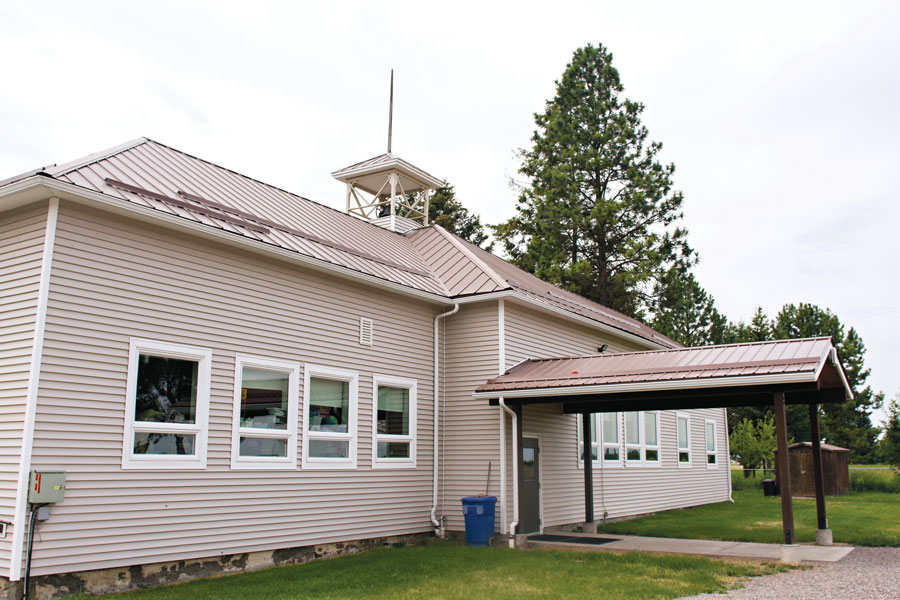Despite a unanimous board vote in favor of building a Wi-Fi tower to boost internet speeds at Creston School, the project is again on hold as the district awaits the outcome of two lawsuits filed by neighbors.
The district originally hoped for the 118-foot monopole to be constructed this summer on gifted land located near the school through an agreement with MontanaSky Networks, but the project was delayed following an outcry from neighbors, who said they hadn’t been properly notified of the project and expressed other concerns.
The district responded by opening up a 30-day public comment period. Following the comment period, the school board voted 4-0 on Sept. 6 to approve the agreement after reviewing a thick stack of submitted comments and documents, including 122 letters in support of the project and 14 against. Petitions were also circulated in opposition.
However, neighbor William Rogers filed a lawsuit to halt the tower, while neighbors Hana and Petr Kukla filed a separate suit.
Principal Tami Ward said an attorney for MontanaSky advised the company not to move forward with the project while litigation is pending. Ward noted that Flathead County District Court is backed up, so she doubts the lawsuits will be settled this calendar year.
“Everything is on hold,” Ward said.
The agreement between MontanaSky Networks and the Creston School District stipulates that MontanaSky, an internet service provider, would provide free internet to the school in exchange for being able to build a tower on a plot of land deeded to the school. MontanaSky would also have access to the area’s customer base.
The land in question was donated to the school in 1994 by Eaner and Etta Higgins, who are both now deceased. It’s located just down the road from the school.
Creston School has long struggled with slow internet speed, which disrupts and limits educational activities. The tower would boost download speeds to 100 megabits per second, roughly five times faster than current speeds.
Ward described having to use her laptop in specific areas of the school to get internet, while the batteries of students’ iPads drain frequently because the devices are searching for a connection. Skype sessions and other learning activities are also impacted, forcing administrators to plan who can access the internet at what times.
“We just don’t have enough broadband at certain times of the day and in certain parts of the school,” Ward said.
Ward said the tower agreement is an ideal opportunity, as MontanaSky takes on the costs of tower construction and provides internet for free, a huge savings for the district. The school’s only other realistic alternative to upgrade broadband connectivity would likely be floating a tech levy.
“We don’t go to the taxpayers unless we absolutely need to,” Ward said. “We thought this was a good no-cost solution.”
Rogers’ litigation says he operates a business out of his home that is “heavily reliant on electronics” and located close to the proposed tower site. He cited concerns that “waves emitted from the tower may interfere with the performance” of his equipment.
Rogers also stated that his property value would likely decrease, and he’s worried the waves would negatively impact the health of “himself, his wife, their pets and chickens.” He filed his litigation without an attorney.
Furthermore, Rogers asserted that the tower would not be “erected for school purposes,” but rather to “enrich the coffers of MontanaSky Networks.” Rogers compared it to a hypothetical of the school allowing “a 500 room luxury hotel on the property, after which the hotel reserved a conference room for school functions and paid the school some percentage of revenues.”
“One could probably derive a ‘school purpose’ for opening a Gentlemen’s Club on the property with enough imagination,” Rogers states.
The Kuklas’ lawsuit alleges the district restricted public participation and unlawfully entered into the agreement, calling the decision “arbitrary, capricious, unreasonable and unlawful.”
In a previous interview, Hana Kukla also expressed health concerns over waves emitted by the tower. Other complaints raised by neighbors included the tower’s potential impact on views.
The district filed a response to Rogers on Sept. 11, refuting his claims point by point, including statements about the agreement’s details. Jean Faure of Faure Holden Attorneys at Law in Great Falls is representing the district.
The response also states that Rogers lacks standing to bring his claim and fails to “state a claim upon which relief can be granted.”
As of Sept. 13, Ward said the district was still preparing its response to the Kuklas.
The district’s response to Rogers also addressed health concerns.
“Radiofrequency emissions,” it states, “from antennas used for cellular and PCS transmissions result in exposure levels that are typically thousands of times below safety limits adopted by the FCC based on the recommendations of expert organizations and endorsed by agencies of the Federal Government responsible for health and safety.”
